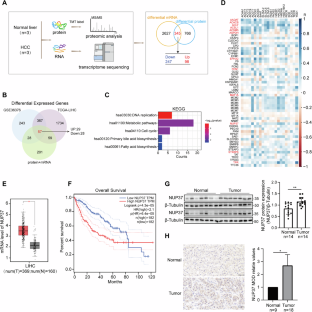由 TRIM28 介导的 NUP37 积累可促进脂质合成,从而加速 HCC 的进展
IF 6.9
1区 医学
Q1 BIOCHEMISTRY & MOLECULAR BIOLOGY
引用次数: 0
摘要
细胞内脂质合成的增加对肝细胞癌(HCC)的进展非常重要。我们的研究旨在确定核蛋白 37(NUP37)在脂质合成和 HCC 进展中的作用。NUP37在HCC中的表达明显上调,并与不良预后相关。沉默 NUP37 可抑制体外 HCC 细胞的脂质合成、增殖、迁移和侵袭,并抑制体内异种移植小鼠模型的肿瘤生长。接下来,我们发现 NUP37 在 HCC 中的高表达与翻译后修饰有关。含有三方基序的28(TRIM28)被鉴定为与NUP37相互作用的蛋白,并上调其蛋白水平。随后的分析发现,TRIM28介导的NUP37在Lys114/118/246处的SUMO化抑制了NUP37与K27连接的多泛素化,这也是其在HCC中高表达的原因之一。总之,TRIM28 SUMOylates NUP37 可阻止其泛素化和蛋白酶体降解,增加 NUP37 蛋白的稳定性,从而促进脂质合成和 HCC 的进展。本文章由计算机程序翻译,如有差异,请以英文原文为准。


NUP37 accumulation mediated by TRIM28 enhances lipid synthesis to accelerate HCC progression
Elevated intracellular lipid synthesis is important for hepatocellular carcinoma (HCC) progression. Our study aimed to identify the role of nucleoporin 37 (NUP37) in lipid synthesis and HCC progression. The expression of NUP37 was significantly upregulated in HCC and associated with a poor prognosis. NUP37 silencing suppressed lipid synthesis, proliferation, migration, and invasion of HCC cells in vitro, and restrained tumor growth in xenograft mouse models in vivo. Next, we found the high expression of NUP37 in HCC was related to post-translational modifications. Tripartite motif-containing 28 (TRIM28) was identified as an interacting protein of NUP37 and upregulated its protein level. The subsequent analysis revealed that TRIM28-mediated SUMOylation of NUP37 at Lys114/118/246 inhibited K27-linked polyubiquitination of NUP37, which is one reason for its high expression level in HCC. In conclusion, TRIM28 SUMOylates NUP37 to prevent its ubiquitination and proteasomal degradation, increasing the stability of the NUP37 protein, thereby promoting lipid synthesis and the progression of HCC.
求助全文
通过发布文献求助,成功后即可免费获取论文全文。
去求助
来源期刊

Oncogene
医学-生化与分子生物学
CiteScore
15.30
自引率
1.20%
发文量
404
审稿时长
1 months
期刊介绍:
Oncogene is dedicated to advancing our understanding of cancer processes through the publication of exceptional research. The journal seeks to disseminate work that challenges conventional theories and contributes to establishing new paradigms in the etio-pathogenesis, diagnosis, treatment, or prevention of cancers. Emphasis is placed on research shedding light on processes driving metastatic spread and providing crucial insights into cancer biology beyond existing knowledge.
Areas covered include the cellular and molecular biology of cancer, resistance to cancer therapies, and the development of improved approaches to enhance survival. Oncogene spans the spectrum of cancer biology, from fundamental and theoretical work to translational, applied, and clinical research, including early and late Phase clinical trials, particularly those with biologic and translational endpoints.
 求助内容:
求助内容: 应助结果提醒方式:
应助结果提醒方式:


